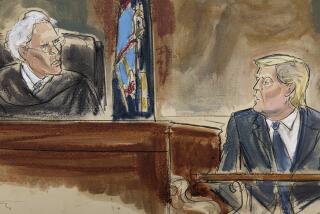Nixon Is Owed for His Tapes, Court Rules
WASHINGTON — Former President Richard M. Nixon won a rare legal victory Tuesday when a federal appeals court ruled he is entitled to compensation for his Watergate tapes and other White House documents seized by act of Congress after his resignation in 1974.
Sources said it could amount to millions of dollars.
In a unanimous decision, the three-member panel ruled that the government violated Nixon’s rights under the Fifth Amendment, which prohibits the seizure of private property for public use without paying the former owner “just compensation.”
The appellate court instructed a lower court to determine how much the former President should be compensated, which some sources believed could amount to many millions of dollars. R. Stan Mortenson, Nixon’s chief lawyer, said he could not speculate on a figure because “no one yet has addressed the issue of value.”
The ruling allows the National Archives to maintain custody of Nixon’s recordings of White House conversations and other presidential papers for public viewing and listening.
Judge Harry Edwards, writing for the U.S. Circuit Court of Appeals for the District of Columbia, said Nixon had a distinct property interest in his records, as did every President before him.
“Upon reviewing the long and unbroken history relating to the use, control and disposition of presidential papers, we are convinced that Mr. Nixon had a well-grounded expectation of ownership,” Edwards wrote. “In short, every past President has treated these materials as private papers to hold, give away, withhold from others, transfer for consideration or bequeath as he saw fit.”
The Justice Department, representing the National Archives in opposition to Nixon, had no immediate comment on whether the ruling would be appealed to the Supreme Court.
The ruling caps a previously unsuccessful 18-year legal battle by Nixon to challenge the constitutionality of the congressional action that seized his tapes and papers and to uphold his privacy and ownership rights.
The ruling also overturns a decision last year by U.S. District Judge John Garrett Penn, who ruled that the government did not owe Nixon any payment for his presidential materials. The papers belong to the public and Nixon held them only as “a trustee for the American people,” Penn had ruled.
Some 42 million documents from the Nixon White House are in the National Archives, including about 4,000 hours of tapes made in the Oval Office and other White House rooms in 1971 through 1973. The archives has released a small portion of the tapes for public listening and is screening additional tapes to remove strictly private conversations.
Nixon’s secret taping system eventually led to his downfall, most historians agree, because it revealed he had privately counseled his chief of staff, H. R. Haldeman, to try to head off an FBI investigation of the 1972 burglary of Democratic offices at Washington’s Watergate Hotel by encouraging CIA officials to tell the bureau a false story. The burglary was financed by Nixon’s reelection committee.
Nixon, who resigned on Aug. 9, 1974, when he faced probable impeachment, lost earlier court battles to take control of his presidential materials and to limit the public’s ability to hear the tapes and review his official papers and memos.
Concerned that Nixon might destroy the material, Congress passed the Presidential Records and Materials Preservation Act, which directed the archives to take custody of the materials, including correspondence, memoranda, political reports, telephone logs, drafts of speeches and the tapes.
Three years later the Supreme Court rejected Nixon’s challenge to the law, but the former President subsequently filed a series of challenges to regulations governing the materials adopted by the General Services Administration, parent agency of the archives.
In their arguments, Nixon’s lawyers said that presidents starting with George Washington considered that they owned all documents they compiled during their terms of office.
Some presidents destroyed their papers, including Chester A. Arthur, whose grandson said Arthur burned the records in three large garbage cans.
There were no apparent political overtones to the appellate court’s decision. Edwards was joined in his opinion by Judge Ruth Ginsburg; both jurists were appointed to the District of Columbia Circuit Court of Appeals by former President Jimmy Carter, the Democrat who won the White House in the wake of the Watergate scandal. Judge Karen LeCraft Henderson, an appointee of President Bush, wrote a separate concurring opinion.
BACKGROUND
The appellate judges traced the history of each earlier President’s papers, and said in all cases the documents were considered private property. Papers of George Washington, James Monroe and James Madison were purchased by Congress in the 1830s and 1840s for $20,000 to $25,000 in each case. Every President from Franklin D. Roosevelt through Jimmy Carter, with the exception of Richard M. Nixon, donated his papers to the government in exchange for a publicly supported presidential library. The papers of Ronald Reagan and George Bush are subject to the Presidential Records Act of 1978, which abolished private ownership of presidential papers.
More to Read
Sign up for Essential California
The most important California stories and recommendations in your inbox every morning.
You may occasionally receive promotional content from the Los Angeles Times.










